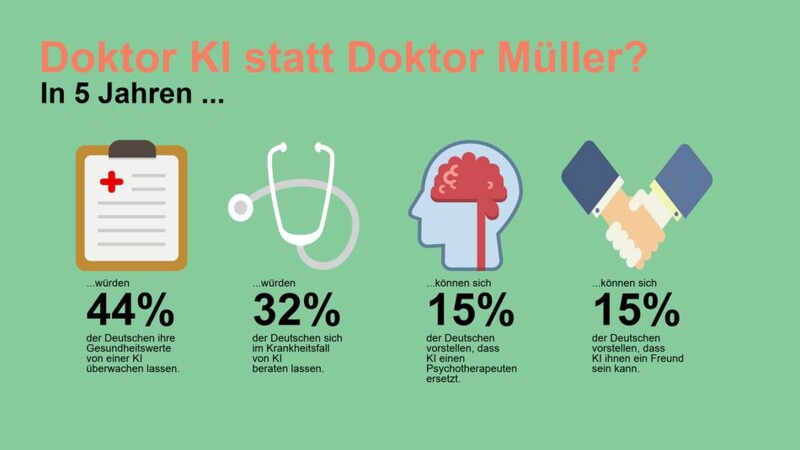Huge amounts of data are produced daily in medicine e.g. blood tests, ECG curves, X-rays or MRIimages. The medical field is ideal for algorithms. “The system learns to distinguish between healthy and pathological findings,” said Margaritoff. And this is by no means limited to a hospital or practical environment, she stressed. “We see this everyday in wearables. The Apple watch, for instance detects irregular heartbeats, which can indicate atrial fibrillation, and send warnings on time.” The use of artificial diagnostic aids is particularly interesting when it comes to rare findings “that even a human eye cannot detect at first glance” and especially for use in far-flung parts of the world where training doctors can be difficult. However, AI controlled medication is still a long way off: “The system can already suggest therapy based on the identified structures. Add the patient’s age, social environment, hobbies and profession and things become far more interesting.”
Hamburg News spoke to Petra Margaritoff, Professor of Medical Data Systems at the Life Sciences Faculty of the Hamburg University of Applied Sciences, about the potential of artificial intelligence (AI), especially machine learning, in medicine. Such cleverly programmed applications are constantly improving thanks to huge amounts of both quantitative and qualitative data. And these applications are outperforming people in many areas today.
Five promising fields of application:
1) Diagnostics
Biotechnology
Imaging processes are sensor-generated, machine-readable signals. Although intelligent systems can evaluate images more precisely, the same approach can only be applied to an organic structure, if the information is machine-readable. AI is being used increasingly in biotechnology for this translation process. “The current method of transferring lipids – bioactive fat molecules – into machine-processable molecule descriptions is done with neuronal networks,” said Margaritoff. If successful, this approach would expand the field for AI assisted diagnostic aids considerably.
3) Robotics and AI supported therapy
Robot-assisted surgery or navigation robots give surgeons greater precision during incisions and have been used in operating theatres for some time e.g. in prostate surgery. The robots do not operate self-sufficiently, Margaritoff stressed, adding: “Operations on tiny structures require precise movements. The robot translates the surgeon’s natural movements, similar to a gear.” Muscular heart support systems also exemplify AI in therapy, she said. If the heart is unable to pump sufficient blood through the organism, various possibilities such as an artificial heart, a mechanical pump or a muscular heart support system are available. “The problem here is that our muscles deteriorate when they are overexerted,” Margaritoff said. If the muscular cardiac support system is under strain, the support muscle regresses and the system becomes less efficient after a certain period of time. Thus, the person and system have to co-operate to exactly the right extent. “AI holds great potential for monitoring purposes and could tell a person: ‘You need to take a break at exactly the right time.’” Then the muscle has to do whatever necessary to prevent deterioration.

Virtual reality applications in education
“This aspect is already lived at our university,” said Margaritoff. Medical emergencies are staged in the SIMLab, which opened in 2015 using virtual reality applications. The laboratory has a Cave Automated Virtual Environment (CAVE), which allows several people to delve into a virtual world simultaneously. “Students are immersed in realistically simulated scenarios and can practise rescue operations in this safe environment under professional guidance,” Margaritoff explained. Other students can help develop these scenarios.
5) Mass data processing
A major data collection project called the Hamburg City Health Study (HCHS) is currently underway at over 30 UKE clinics and institutes. As part of the world’s biggest local health study, they are all striving to uncover why people take ill and how they can be treated more specifically and individually in future. AI is extremely valuable at identifying risk factors related to heart attacks, strokes or dementia and can detect unobvious disease factors and establish unexpected causal relationships. Margaritoff added: “The study found a connection between shoe size and heart attacks. All those people, who wear shoe size 46 and higher could be screened annually.” Such findings could then be added to wearables and make it easier to monitor high-risk patients continuously. While this may be a future dream, it is no longer unlikely.
Hurdles – ethics and regulations
However, several obstacles have yet to be overcome en route to this future, she stressed. Apart from providing appropriate data, privacy and ethical issues have to be considered. How invasive can data collection be? How do you justify taking blood or X-rays to collect data, i.e. to make the patient quasi the object of AI development? Lastly, the regulatory handling of AI is important. Medical products require CE marking for approval, Margaritoff explained. “There is a risk-benefit analysis to this. If self-learning systems make their own decisions and this decision-making process changes over time, how can you prove that the system functions without risks? AI is already used to support diagnostics today, but doctors still make decisions about therapy and medication. “Let’s think one step ahead towards automated therapy…who takes responsibility in the event of medical malpractice?”
ys/pb
Sources and further information
Read the other parts of our AI series as well:
Part 1: Artificial intelligence – a tool not a mind
Part 2: jung diagnostics: Algorithms for MRI image analysis
Part 3: My colleague, the robot – a popular member of staff?
Part 4: Artifical intelligence – catalyst of positive future
Part 5: Humanoid robotics: Step by step towards normality
Part 6: Robotic cars to take to Hamburg’s roads?
Part 7: No need to fear artificial intelligence
Part 8: Hamburg to get Health AI Hub – start-ups joining forces
Part 9: AI ‘Made in Germany’ conquering outer space
Similar articles

No need to fear artificial intelligence

Artificial intelligence - a tool not a mind
